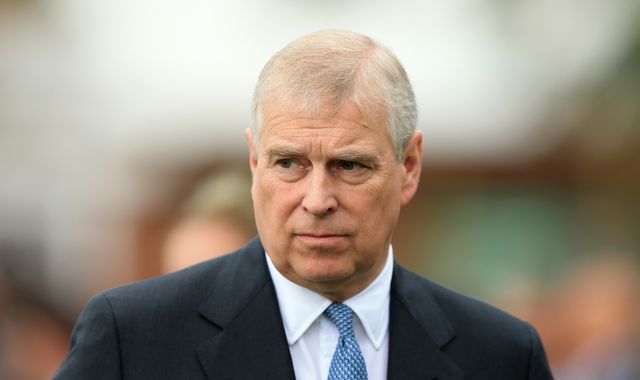‘Very likely’ UK government will decide if Prince Andrew must answer questions over Jeffrey Epstein
Written by News on 13/07/2020
A leading extradition lawyer has told Sky News it is “very likely” the UK government and the Home Office will play some part in deciding if and when Prince Andrew talks to authorities in the US about Jeffrey Epstein.


At the moment the Duke of York won’t and can’t be extradited because authorities in the US only want to talk to him as a witness regarding convicted sex offender Jeffrey Epstein, but last month it was reported that prosecutors had submitted a mutual legal assistance request (MLA) asking the Home Office for their assistance to speak to Prince Andrew.
Karen Todner, who dealt with attempts to extradite computer hacker Gary McKinnon and alleged hacker Lauri Love to the US, told Sky News an MLA makes it virtually impossible for the UK government and Home Office to avoid the ongoing battle with Prince Andrew and they will inevitably be involved.
She said: “From my understanding the Americans are not happy about Prince Andrew giving a prepared statement, that’s not what they want from him, they want to have the opportunity to ask him questions and for him to be under oath when he does that.”
She added: “Prince Andrew doesn’t have diplomatic immunity so if the process has started it will follow through. There are various reasons that the UK authorities would have to look at to show that the mutual legal assistance request was valid, that it was asked for the right reasons, but I can’t see any issues with that at the moment.”
Asked how long that process may take, Ms Todner said: “I should think that this MLA is sitting on some Home Office desk with someone with very hot fingers trying not to touch it, but at some point they are going to have to touch it and I think it’ll certainly be resolved within the next six months or so, if his legal team decide to judicially review the issuing of the mutual legal assistance request that in itself can take anything up to a year.”
Two weeks ago Prince Andrew’s legal team again stressed that they have offered to speak to the Department of Justice (DOJ) in the US, who wish to speak to him as a witness, and not a suspect, regarding his friendship with paedophile Jeffrey Epstein.
They said: “The Duke of York has offered his assistance to the DOJ investigation on a number of occasions this year. In addition, the working group have pro-actively contacted the DOJ twice in the last month and have received no response. That is why we remain utterly bewildered by the DOJ’s approach.”
But prosecutors in the US have said they’re still waiting to hear from them. Ms Todner believes the confusion probably lies in how both sides want him to give evidence, with Prince Andrew’s team doing everything they can to stop him being interviewed in person.
Ms Todner said: “I would think that the reason they don’t want him to be effectively cross-examined, questioned orally is that he gave a fairly disastrous television interview and I think that they just don’t want that scenario to play out again in a situation where he’s under oath and that evidence might then be called into a court.”
She added: “I think their priorities will be to minimise the risk to him of becoming a suspect, and to ensure that they have control, as much as they possibly can, over what he says so that he doesn’t have another disastrous interview like he had before.”
Prosecutors have said they are still want to talk to Prince Andrew following the arrest of his friend, and Jeffrey Epstein’s former girlfriend, Ghislaine Maxwell. Maxwell is expected to appear via videolink for a bail hearing in New York on Tuesday, charged with aiding Epstein’s sex crimes.
Ms Todner said the chances of Maxwell taking a plea bargain deal are extremely high, and that could mean more questions for Prince Andrew.
“The odds are always stacked up monumentally high against people who want to go for trial in America so the likelihood is, the odds say that she’ll take a plea agreement,” she said.
“If you take a plea agreement in America, you are interviewed by American police officers and attorneys and you have to give full and frank information for anything that they want to ask you, so you have to clear the decks effectively, and they have a very wide, a very broad arena that they can ask questions over.”
When asked how likely it was that the Americans would back down on wanting Prince Andrew to talk in person, Ms Todner said it was “very unlikely”.
“My experience of the Americans in judicial proceedings is that they feel they police the world and that what they say goes, and you’ve got to have a fairly compelling reason for what they want, not to happen,” she said.
Prince Andrew has always denied seeing anything improper that he believed should be reported to the police during his time with Epstein and strenuously denies the allegations made against him by Virginia Roberts Guiffre.
(c) Sky News 2020: ‘Very likely’ UK government will decide if Prince Andrew must answer questions over Jeffrey Epstein






